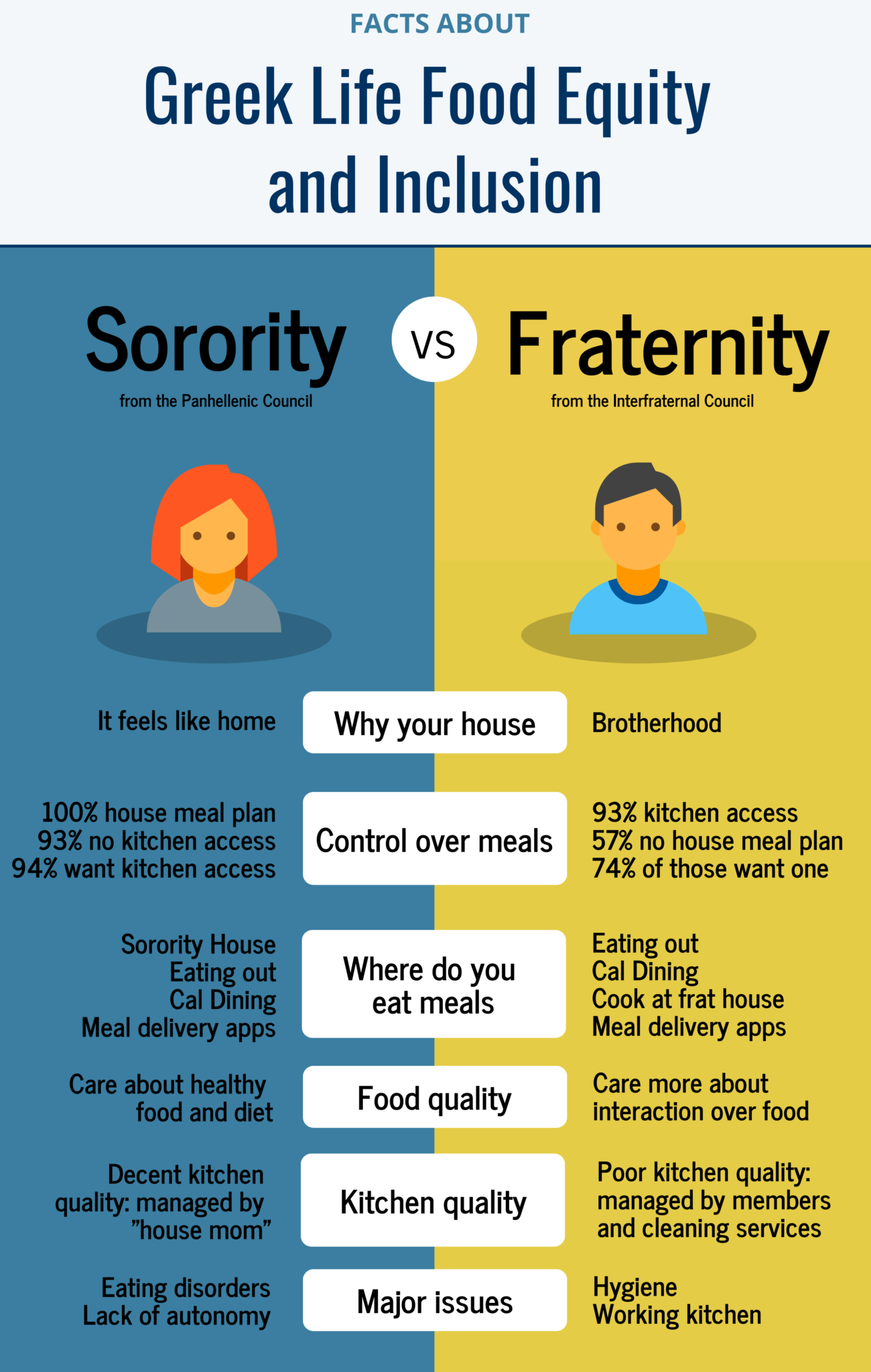Foodscape Map: Greek Life
Approximately 3,600 Berkeley undergraduate students participate in CalGreeks, the UC Berkeley community of over 60 fraternities and sororities. CalGreeks promotes four pillars: Friendship, Scholarship, Leadership, and Service. As almost 12% of Berkeley undergraduates participate in Greek life, the fraternities and sororities are a significant yet previously understudied segment of the campus food system. Determining the inclusivity and equitability of the UC Berkeley Greek Community’s food system is a challenge. What we learned throughout our research was that approaching the Greek System was like trying to squeeze a triangle through a circle: what method worked for one chapter wouldn’t necessarily work for another. The Greek councils are home to an abundance of different structures and lived experiences. This contributes to a dynamic system but also adds to a divorce between the Greek community and the campus, the different councils, and councils and members.
We collected data via survey distribution in fall 2017 and spring 2018. Eight surveys were created that were tailored to the general structure of Berkeley’s four Greek councils and their respective presidents: the Intrafraternity Council (IFC: representing 30 fraternities, the Panhellenic Council (PHC: representing 14 sororities), the Multi-Cultural Greek Council (MCGC: representing 14 culturally based fraternities and sororities), and the National Pan-Hellenic Council (NPHC; 6 historically African-American fraternities and sororities). We created two additional surveys for the members and presidents of PHC chapters without affiliated houses. Our survey response was as follows: 274 members of PHC, 107 members of IFC, 6 members of MCGC, 0 members of NPHC, and 0 members of PHC chapters without houses. This represents an overall response rate of ~11% of Greek members.
Despite efforts, we had difficulties in receiving responses from either MCGC or NPHC. Therefore our data on ethnicity/racial identification is not representative of the entire Greek Community, only of respondents to IFC and PHC surveys. Within PHC, we received even responses from across the council, but IFC respondents were concentrated in a smaller number of chapters, including a predominantly People of Color house. So while IFC is more ethnically diverse than PHC, our data is likely skewed toward more diversity than the reality of IFC. For full disclosure, our team of five data collectors included three members of PHC, one member of IFC, and one member of MCGC. Our inability to forge meaningful connections with specifically multicultural and African American chapters speaks to divisions within the Greek community, both in regards to racial identity, and between chapters with houses and without. The majority of MCGC and NPHC chapters do not have affiliated houses in Berkeley—whereas almost all IFC and PHC chapters do—which in itself speaks to structural inequalities in the Greek System.
Of note we also did not receive responses from members of PHC chapters without houses. Furthermore, we could not survey the 15 fraternities and sororities that are not recognized by UC Berkeley, as we were not able to obtain contact information. The Greek System nationally has been heavily criticized for issues of racial segregation (historically, White Greek organizations had race-based membership in place through the 1960s), sexism, and homophobia. By regulation the vast majority of Greek chapters are gender-segregated, and most do not take a stance on supporting transgender/gender-nonconforming students. A university such as Berkeley, which is known for its diverse and inclusive environment and progressive values, has an opportunity to determine the culture within their own Greek chapters. Recent attempts to address these issues, however, have shown that even at Berkeley, it is a rocky road. In a 2017 diversity and inclusivity presentation required for all PHC members, the overarching Berkeley PHC council modified the presenter’s slides without her permission to make them “less strong” on the topics of implicit bias, the LGBTQ+ community, and racism.
Our data on food insecurity among Greek members was also inconclusive. We asked if survey participants had ever cut the size of your meals or skip meals because there wasn’t enough money for food both before and during UC Berkeley attendance. 6% of PHC respondents and 20% of IFC respondents said they had skipped meals prior to attending Berkeley, compared to 32% of members of both councils who said they had skipped while in college. However, we did not include a question about whether or not respondents had skipped meals since joining the Greek System, and therefore we cannot properly determine the effect Greek life has on students’ food security. We hope this question will be answered in future studies. Of note, however, very few respondents indicated that they were aware of Basic Needs Security services on campus.
Despite the setbacks, we were impressed by the participation from IFC and PHC. It is perhaps no surprise that the data often showed contrasting results. Inherently, the cultures of fraternities and sororities are very different, and this extends to the way food is structured. PHC chapters with houses have a hired kitchen staff that prepares all their meals, and members do not have kitchen access. Food structure in IFC chapters differs house to house—ranging from a kitchen staff, to CalDining meal plans, to no included food plan. PHC survey respondents expressed a desire for more autonomy. IFC survey respondents expressed a desire for more structure, and 68% would be willing to pay more for a house meal plan. It is important to recognize that the UC Berkeley Greek system strives to be a community where students can find a deep sense of belonging. As they move towards equity and inclusion, there comes an opportunity to learn from one another and become a more unified network of ideas and collaboration, and for each student to shape their community, thereby gaining a deeper sense of personal connection.
Going forward, we hope that the councils can increase transparency. With increased accessibility comes the ability to perceive the entire Greek system’s ability to meet member needs. IFC and PHC responses have helped expose the limitations of their food systems, and have enabled us to develop a plan that we hope will be adopted (see policy recommendations below). See survey results for IFC and PHC members. Note all demographic and identifying data related to specific chapters has been removed. See summary charts of demographic data below.

Data collection by Samantha Barney, Justin Loew, Shannon Prendergast, Julia Scheinman, and Garrett Seno. Visualization by Boyue Xu. Pie charts by Samantha Barney, Rosalie Z. Fanshel, and Shannon Prendergast.
Policy Recommendations
As researchers, we offer the following policy recommendations to address issues of diversity, equity, and inclusion within Greek Life’s food experiences.
- Require Greek Councils to collect demographic information about their members so as to create a baseline for evaluating diversity, equity, and inclusion.
- Create a Greek Food Policy Council, modeled after the Greeks Against Sexual Assault Council, with the following functions:
- Provide opportunities for members of all four Greek Councils to connect over shared meals in students of color-friendly, gender-inclusive communal spaces such as the Multicultural Community Center. Use shared meals as a starting point for discussions of diversity, equity, and inclusion.
- Provide confidential workshops on eating disorders.
- Host discussions on how the socially diverse, progressive culture of UC Berkeley can override the national standards and cultures of the Greek system, specifically around safe, inclusive parties and in-house food preparation.
- Create a taskforce of MCGC and NPHC members to learn about, and act on, how Greek system structures affect their access to food,including barriers to obtaining chapter houses.
Raise awareness and normalize the use of campus Basic Needs Security food assistance programs in Greek chapters. - Tailor toolkits to PHC and IFC contexts to help empower members to participate in decision-making around their food. Design activities that individual houses can use to determine what they want their food systems to look like (in-house meal plans with professional cooks, shared member cooking duties, a combination of prepped food and wholesale items, frequency of communal meals, etc.)
- Create an “Eat Together” Campaign to encourage fraternity members to share meals at their houses at set times.
- Create a food recovery plan for PHC sororities so that leftover food can be utilized by students in need. This plan should include inviting non-PHC Berkeley students to sorority meals.
- Hold cooking workshops for members of all Greek chapters.
- Appoint a Food Advocate for each Greek chapter, modeled on the Health Workers role.

